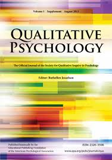
Qualitative Psychology
Scope & Guideline
Elevating qualitative inquiry to shape the future of psychology.
Introduction
Aims and Scopes
- Qualitative Research Methodologies:
The journal primarily emphasizes various qualitative methodologies, including narrative inquiry, ethnography, and phenomenological analysis, allowing researchers to explore psychological phenomena in depth. - Intersectionality and Identity:
A consistent focus on the intersectionality of identity, including race, gender, and sexuality, is evident in the journal's publications, addressing how these factors shape individual experiences and social dynamics. - Social Justice and Community Engagement:
Qualitative Psychology actively promotes research that engages with social justice issues, exploring the lived experiences of marginalized communities and advocating for transformative practices within psychology. - Reflexivity and Researcher Positioning:
The journal highlights the importance of reflexivity in qualitative research, encouraging researchers to consider their positionality and the impact of their perspectives on the research process and findings. - Narrative and Storytelling:
Narrative methods are a central theme, with a focus on how stories shape identities and experiences, fostering a deeper understanding of psychological constructs through personal and collective narratives. - Contextual and Cultural Considerations:
There is a strong emphasis on the contextual and cultural dimensions of psychological research, recognizing that human experiences are embedded within specific social and cultural frameworks.
Trending and Emerging
- Ethnographic Approaches:
There is a growing trend towards ethnographic methods, which allow for an in-depth exploration of cultural and social contexts, as seen in studies examining community dynamics and identity. - Exploration of Marginalized Voices:
A notable increase in research focusing on the experiences of marginalized groups, such as Black, Indigenous, and LGBTQ+ communities, emphasizes the importance of diverse perspectives in psychological research. - Interdisciplinary Methods:
Emerging themes include the integration of interdisciplinary approaches, combining insights from sociology, anthropology, and cultural studies to enrich qualitative psychological research. - Reflexive Methodologies:
Reflexivity is increasingly emphasized, with researchers reflecting on their roles and influences in the research process, fostering a more ethical and conscious approach to qualitative inquiry. - Narrative and Arts-Based Research:
The use of narrative and arts-based methods is on the rise, promoting innovative ways to engage with participants and present findings, thereby enhancing the accessibility and impact of qualitative research. - Focus on Social Justice and Activism:
There is a strong trend towards research that advocates for social justice, with scholars using qualitative methods to challenge systemic inequalities and promote community empowerment.
Declining or Waning
- Traditional Quantitative Paradigms:
There is a noticeable decline in the integration of traditional quantitative methods within qualitative research discussions, as the journal increasingly prioritizes qualitative approaches that emphasize depth over numerical data. - Generalization of Findings:
The focus on generalizing qualitative findings to broader populations appears to be diminishing, with a growing recognition of the unique and context-specific nature of qualitative insights, moving away from the push for universal applicability. - Methodological Rigor in Conventional Terms:
Discussions around conventional notions of methodological rigor are less frequent, as the journal embraces more flexible and context-sensitive approaches to qualitative inquiry that challenge established criteria. - Focus on Individualistic Narratives:
While individual narratives remain important, the journal is shifting towards more collective and community-oriented narratives, reflecting a broader social context rather than solely focusing on individual experiences. - Static Theoretical Frameworks:
There has been a decrease in reliance on static theoretical frameworks, with more emphasis placed on dynamic and evolving theories that better capture the complexities of human experiences.
Similar Journals
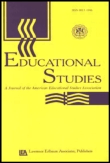
Educational Studies-AESA
Exploring the intersection of educational dynamics and societal impact.Educational Studies-AESA, published by Routledge Journals, Taylor & Francis Ltd, is a prestigious peer-reviewed journal that serves as a vital platform for sharing cutting-edge research in the fields of education, sociology, and political science. With an ISSN of 0013-1946 and an E-ISSN of 1532-6993, this journal holds a commendable status, reflected in its strong rankings: it is positioned in the Q2 category in both Education and Sociology/Political Science, emphasizing its significant impact in these disciplines. Moreover, with Scopus rankings that place it in the 62nd and 48th percentiles within its categories, Educational Studies-AESA is recognized for its contributions to scholarly discourse and is an essential resource for researchers, professionals, and students alike seeking to deepen their understanding of educational dynamics and their societal implications. While this journal is not currently open access, it remains a vital scholarly source, enriching the academic community from its base in the United Kingdom, addressing vital educational issues from 2018 to 2024 and beyond.
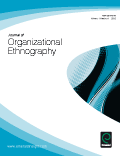
Journal of Organizational Ethnography
Engaging Conversations Around Ethnographic ResearchJournal of Organizational Ethnography is a prestigious academic journal published by Emerald Group Publishing Ltd, renowned for its comprehensive exploration of organizational culture and behavior through the lens of ethnographic research. Since its inception in 2012, the journal has become a key platform for scholars and practitioners in the fields of Anthropology, Cultural Studies, and Organizational Behavior, ranking Q1 in both Anthropology and Cultural Studies, and maintaining strong placements across other relevant disciplines. With an emphasis on qualitative methodologies and reflexivity, the journal aims to illuminate the complex dynamics within organizations, fostering dialogue and innovation. The Journal of Organizational Ethnography is essential for researchers, professionals, and students looking to deepen their understanding of organizational practices, navigate cultural complexities, and engage in critical conversations that shape the future of the workplace. For those interested in contributing or accessing valuable research, this journal stands as a vital resource in the academic community.
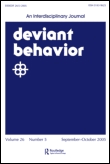
DEVIANT BEHAVIOR
Advancing Insights into the Dynamics of Deviant BehaviorDEVIANT BEHAVIOR, published by Taylor & Francis Inc, is a prestigious academic journal that has significantly contributed to the fields of Clinical Psychology, Law, Social Psychology, and Sociology since its inception in 1979. With an impressive range of objectives aimed at advancing understanding of deviant behavior in a variety of social contexts, this journal plays a pivotal role in fostering interdisciplinary dialogue among researchers and practitioners. The journal currently holds a Q2 ranking in Clinical Psychology and Social Psychology, and a Q1 ranking in both Law and Sociology and Political Science, highlighting its esteemed position within academic circles. DEVIANT BEHAVIOR is indexed in Scopus, with commendable rankings in multiple social science categories, reflecting its influence and reach—ranking within the top 10th percentile in Law and Sociology and Political Science. Researchers and students can benefit from the journal’s rigorous peer-review process and rich insights, as it continues to explore the complexities of deviant behavior across diverse contexts and populations in the United Kingdom and beyond. For those seeking to delve deeper into contemporary issues related to deviance, this journal remains an indispensable resource.

Behavior and Social Issues
Exploring the Dynamics of Human Behavior and SocietyBehavior and Social Issues, published by Springer, is a prominent academic journal dedicated to advancing the understanding of behavioral studies and social concerns. With an ISSN of 1064-9506 and an E-ISSN of 2376-6786, this journal serves as a critical platform for researchers, professionals, and students who are committed to exploring the intricate dynamics of human behavior and the social issues arising in contemporary society. Although currently not designated as Open Access, the journal aims to disseminate high-quality empirical research, theoretical advancements, and insightful reviews that contribute to the field's development. Located in New York, with a reputation for rigor and academic excellence, Behavior and Social Issues is invaluable for anyone seeking to engage with pressing social topics through a scientific lens.
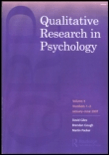
Qualitative Research in Psychology
Fostering interdisciplinary connections in qualitative psychology.Qualitative Research in Psychology is a premier journal dedicated to advancing the field of qualitative research within psychology. Published by Routledge Journals, Taylor & Francis Ltd, this influential journal has established itself as a pivotal resource since its inception in 2004 and is set to continue its impactful journey through 2024. With an impressive Q1 ranking in the miscellaneous psychology category, it ranks #6 out of 216 in general psychology according to Scopus, placing it within the top 3% of its field. The journal's commitment to promoting qualitative methodologies makes it an essential platform for researchers, professionals, and students aiming to explore the complexities of human behavior and mental processes. Though it currently does not offer open access options, the journal provides critical insights and rigorous scholarly discussions that enrich the academic community's understanding of qualitative approaches. As a vital contributor to the psychological sciences, Qualitative Research in Psychology encourages interdisciplinary dialogue, ensuring that diverse voices and perspectives are included in the ongoing research discourse.
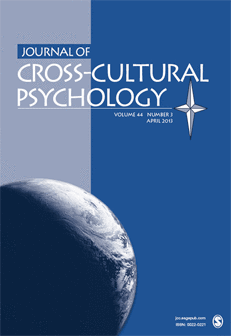
JOURNAL OF CROSS-CULTURAL PSYCHOLOGY
Bridging Psychological Insights GloballyJOURNAL OF CROSS-CULTURAL PSYCHOLOGY, published by SAGE PUBLICATIONS INC, is a premier journal dedicated to the exploration and understanding of psychological phenomena across diverse cultural contexts. With an impressive impact factor reflective of its significance in the academic community, this journal ranks in the top quartile (Q1) for Anthropology, Cultural Studies, and Social Psychology, making it a vital resource for researchers and professionals alike. Spanning from its inception in 1970 to the upcoming year of 2024, the journal covers a wide array of topics that illuminate the nuances of human behavior and cultural interactions, supported by rigorous empirical research. It holds notable rankings in Scopus, including a remarkable 42nd position in Cultural Studies, ensuring its content reaches a high-impact audience. Researchers, students, and practitioners interested in the intersection of culture and psychology will find the journal invaluable for advancing their knowledge and contributing to this dynamic field.

Departures in Critical Qualitative Research
Unpacking the Layers of Qualitative UnderstandingDepartures in Critical Qualitative Research, published by University of California Press, is an influential journal dedicated to advancing knowledge within the realms of Communication and Linguistics and Language. With its commitment to exploring the complexities and nuances of qualitative research, this journal has quickly established itself as a vital resource for scholars and professionals alike. Although it currently resides in the fourth quartile in Communication and the third quartile in Linguistics, its notable Scopus rankings, including a 64th percentile in Language and Linguistics, highlight its growing significance in the academic discourse. Covering a converged period from 2019 until 2024, the journal seeks to foster innovative and critical perspectives on qualitative methodologies, offering invaluable insights that address contemporary social issues. Access to its content is available to a wide audience, contributing to the journal's reputation as a beacon for those engaged in critical qualitative research.
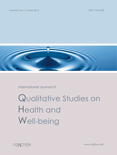
International Journal of Qualitative Studies on Health and Well-Being
Unlocking the narratives of health and well-being.International Journal of Qualitative Studies on Health and Well-Being is a premier academic platform, published by Taylor & Francis Ltd, that has been dedicated to advancing the field of health and well-being through qualitative research since its inception in 2006. With an Open Access model, the journal ensures that vital research findings are accessible to a global audience, fostering greater collaboration and innovation among scholars, practitioners, and students alike. Recognized for its robust impact within the academic community, it boasts a commendable Q1 classification in Fundamentals and Skills and ranked #3 in Nursing related to this category, demonstrating its commitment to publishing high-quality and impactful research. Additionally, the journal holds strong positions in areas such as Gerontology and Health Policy, making it a critical resource for those studying the multifaceted aspects of health. With a focus on ethical considerations and legal aspects of healthcare, it invites submissions that can contribute to the ongoing dialogue surrounding health policies and practices. Situated in Oxon, England, the journal's multidisciplinary approach is essential for guiding research that will influence future practices in the healthcare sector.
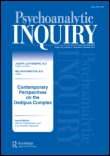
PSYCHOANALYTIC INQUIRY
Illuminating Diverse Perspectives in Psychoanalytic InquiryPSYCHOANALYTIC INQUIRY is a distinguished journal published by Routledge Journals, Taylor & Francis Ltd, dedicated to advancing the field of psychoanalysis in the context of clinical psychology. Since its inception in 1981, the journal has served as a vital platform for scholars, practitioners, and students to exchange innovative ideas and research findings. With its Q4 category ranking in the 2023 Clinical Psychology quartile, the journal reflects a diverse array of psychoanalytic perspectives and their practical applications in contemporary psychology. Although it operates under a traditional access model, its content is invaluable for those seeking to deepen their understanding of clinical psychoanalysis and its implications for therapeutic practices. Aiming to foster intellectual discourse and enhance clinical practices, the journal navigates through the complexities of the human psyche, making it an essential resource for anyone committed to the nuanced study of psychoanalysis.

Qualitative Research in Sport Exercise and Health
Connecting Theory and Practice in Qualitative ResearchQualitative Research in Sport, Exercise, and Health, published by ROUTLEDGE JOURNALS, TAYLOR & FRANCIS LTD, stands as a premier academic journal in the interdisciplinary exploration of health, physical therapy, and social psychology. With an impressive Q1 ranking across multiple categories including Health (social science), Physical Therapy, Sports Therapy and Rehabilitation, and Social Psychology, this journal is dedicated to advancing qualitative methodologies and frameworks within the realm of sport and exercise sciences. The journal has been continuously publishing since 2011 and embraces a global perspective from its base in the United Kingdom, fostering scholarly dialogue that is essential for researchers, practitioners, and students alike. Although it operates under a traditional subscription model, the journal's significant impact, demonstrated by its top-tier rankings and commendable Scopus positioning—in the 97th percentile for Physical Therapy—ensures it remains a vital resource for insights into the qualitative aspects of sport, exercise, and health, contributing meaningfully to evidence-based practice and policy development in these critical fields.